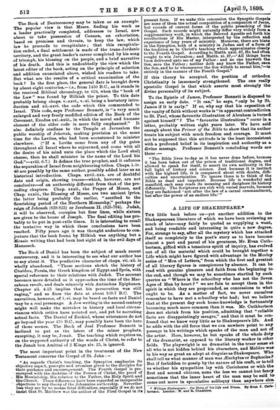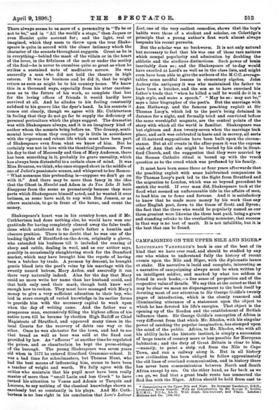A LIFE OF SHAKESPEARE.*
Tun little book before us—yet another addition to the Shakespearean literature of which we have been reviewing so much of late—may fairly be quoted as supplying a want, and being readable and interesting in quite a new degree. For, strange to say, after all the mystery which has attached itself so completely to the poet's story as to have become almost a part and parcel of his greatness, Mr. Evan Oath- bertson, gifted with a tenacious spirit of inquiry, has evolved out of all the material which could be brought together a. Life which might have figured with advantage in the Morley series of "Men of Letters," from which the first and greatest of all literary figures is conspicuous by absence. It can be read with genuine pleasure and faith from the beginning. to the end, and though we may be sometimes startled by such queries as "Where is the schoolboy who has not the Seven Ages of Man by heart ? " we are fain to accept them in the spirit in which they are propounded, as concessions to what ought to be. As a matter of fact, we never ourselvea remember to have met a schoolboy who had; bat we believe that at the present day such home-knowledge is fortunately becoming much more common than it was. Mr. Cuthbert/3ot% does not shrink from his position, admitting that "reliable facts are disappointingly meagre," and that it must be con- fessed that we know very little as to Shakespeare's life. And he adds with the old force that we can nowhere point to any passage in his writings which speaks of the man and not of the artist. Here, however, he but speaks of the whole duty of the dramatist, as opposed to the literary worker in other fields. The playwright is no dramatist in the truer sense at all who is not hidden behind his characters, and MoliZre was- in his way as great an adept at disguise as Shakespeare. Who shall tell us what manner of man was 2Eschylus or Sophocles But if forbidden to gossip by the nature of his craft, or to tell us whether his sympathies lay with Coriolanns or with the first and second citizens, none the less we cannot but fancy sometimes that the inner heart of the man may be said to- come oat more in speculative soliloquy than anywhere else.
• William Shakesprare : the Story of his Life and Times. By Evan J. Osta- I bertson. London : W. and B.. Chambers. There always seems to us more of a personality in "To be or not to be," and in "All the world's a stage," than Jaques or even Hamlet quite account for ; and the light, real or imagined, which they seem to throw upon the true Shake- speare is quite in accord with the closer intimacy which the character of the sonnets throughout suggests. Great as he is in everything—behind the mask of the villain or in the heart of the lover, in the fitfulness of the mob or under the motley of the fool—he is never to ourselves quite so great as when he strikes a sustained note of meditative sorrow. He was assuredly a man who did not hold the theatre in high esteem. It was his business and he did it, that he might return as soon as might be to his country home. We know this in a thousand ways, especially from his utter careless- ness as to the future of his work, so complete that but for the loving offices of friends it would hardly have survived at all. And he alludes to his feeling constantly subdued to his groove like the dyer's hand. In his sonnets it comes out clearly, though we agree with Mr. Cuthbertson in feeling that they do not go far to supply the deficiency of personal portraiture which the plays suggest. The dramatist was with Shakespeare always, and it is an imaginary kind of author whom the sonnets bring before us. The dreamy, senti- mental lover whom they conjure up is little in accordance with the vigorous and robust life which must have been part of Shakespeare even from what we know of him. But he certainly was not in love with the theatrical profession. From his day to that of Macready and then of Mary Anderson, there has been something in it, probably its grave unreality, which has always been distasteful to a certain class of mind. It was Miss Brunton, we think, who once stopped short in the middle of one of Juliet's passionate scenes, and whispered to her Romeo: "What nonsense this pretending is—suppose we don't go on with it." And there may be more than fancy in the idea that the Ghost in Hamlet and Adam in As You Like It both disappear from the scene so prematurely because they were parts which Shakespeare himself acted, and he wanted it over betimes, as some have said, to sup with Ben Jonson, or as others maintain, to go in front of the house, and count the money.
Shakespeare's heart was in his country home, and if Mr. Cuthbertson had done nothing else, he would have won our gratitude for having completely cleared away the false tradi- tions which attributed to the poet's father a humble and obscure position. There is no doubt that he was one of the leading lights of Stratford-on-the-Avon, originally a glover, who extended his business till it included the rearing of sheep and cattle, dealing in wool, and as our author says, possibly in occasionally slaughtering stock for the Stamford market, which may have brought him the repute of having been a butcher by trade. A yeoman by descent, he brought gentle blood into the poet's veins by his marriage with the sweetly named heiress, Mary Arden, and assuredly it ran there very naturally indeed. Alas for the day that Mary could no more write her name than her husband could, and that both only used their mark, though both knew well enough how to reckon. They must have managed with Mary's money to give a very sufficient education to their boy, who laid in store enough of varied knowledge in its earlier forms to provide him with the necessary capital to work upon when the day of writing came. And the father was a prosperous man, successively filling the highest offices of his native town till he became by election High Bailiff or Chief Magistrate of Stratford, and appeared many times in the local Courts for the recovery of debts one way or the other. Once he was ale-taster for the town, and had to see that bread as well as beer was sold at the fixed cost provided by law. As " affeerar " at another time he regulated the prices, and as chamberlain he kept the purse-strings of the borough. The young Shakespeare was seven years old when in 17I he entered Stratford Grammar-school. It was a bad time for schoolmasters, but Thomas Hunt, who had the best means of influencing him, seems to have been a teacher of weight and worth. We fully agree with the critics who maintain that his pupil must have been really master of more than "small Latin and less Greek" to have turned his attention to Venus and Adonis or Tarquin and Lucrece, to say nothing of the classical knowledge shown so carelessly but so constantly in his plays. And Mr. Cuth- bertson is no less right in his conclusion that Love's Labour Lost, one of the very earliest comedies, shows that the boy's habits were those of a student and scholar, on Coleridge's principle that a young author's first work almost always bespeaks his recent pursuits.
But the scholar was no bookworm. It is not only natural but necessary to feel that his was one of those rare natures which compel popularity and admiration by doubling the athletic and the studious distinctions. Such power of brain inevitably does so ; and the Shakespeare of to-day would have excelled at Lord's as well as in the class lists, and might even have been able to give the authors of the M.C.C. average- tables some needful lessons in elementary algebra. John Aubrey the antiquary it was who maintained the father to have been a butcher, and the son so to have exercised his father's trade that "when he killed a calf he would do it in a high style, and make a speech." "May be so : may not be," says a later biographer of the poet's. But the marriage with Ann Hathaway, and the famous poaching exploit at Sir Thomas Lucy's, which led to the poet's being detained in durance for a night, and formally tried and convicted beton the same worshipful magnate, are the central points of the story with which all the world is familiar. Shakespeare was but eighteen and Ann twenty-seven when the marriage took place, and as it was celebrated in haste and in secrecy, all sorts of ill-natured suppositions have been built upon the circum- stance. But at all events in the after-years it was the express wish of Ann that she might be buried by his side in Strat- ford Church, and the suggestion that they were married by the Roman Catholic ritual is bound up with the vexed question as to the creed which was professed by his family.
It must have been some three or four years afterwards that the poaching exploit with some hairbrained companions in Sir Thomas Lucy's park led to the flight from Stratford and the migration to London, which was so beyond precedent to enrich the world. If ever man did, Shakespeare took at the flood what seemed an unfavourable tide in the affairs of men, to lead him on to fame and fortune. And it is satisfactory to know that he made more money by his work than any other English poet, down to the times of Scott and Byron; the fact that the three who would be popularly named as our three greatest were likewise the three best paid, being a grave and standing rebuke to the everlasting nonsense, that success in that way is no test of merit. It is not infallible, but it is the best that can be found.



































 Previous page
Previous page